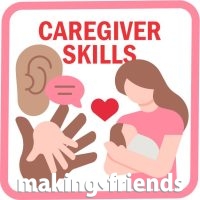Caregiver Skills Patch Program®
2″ Embroidered Iron-On Patch.

This 2″ iron-on embroidered patch is part of our patch program®.

Suggestions for how younger girls can earn the Caregiver Skills Patch.
- Download the “What Should You Do” worksheet provided with your order confirmation. Each scenario represents a situation you may find yourself in. How you handle yourself will represent your level of maturity. Circle the letter that best represents an adult behavior. There may be more than one right answer. Discuss why you chose your answer.
- 1. Attend a workshop or seminar on caregiving, covering topics such as empathy, communication, and basic caregiving skills.
2. Volunteer at a local nursing home, hospital, or animal shelter for a minimum of 10 hours, providing care and companionship to residents, patients, or animals.
3. Interview a caregiver (e.g., nurse, teacher, parent) to learn about their experiences, challenges, and rewards of caregiving.
4. Complete a project that demonstrates caregiving skills, such as creating care packages for the homeless, organizing a fundraiser for a charity, or caring for a plant or pet.
5. Reflect on your experiences and learnings from the program in a journal or blog post, sharing how caregiving has impacted your life and the lives of others.
-or-
- Earn Any Girl Scout Financial Literacy Badge
Suggestions for how older girls can earn the Caregiver Skills Patch.
 Download the “What Should You Do” worksheet provided with your order confirmation. Each scenario represents a situation you may find yourself in. How you handle yourself will represent your level of maturity. Circle the letter that best represents an adult behavior. There may be more than one right answer. Discuss why you chose your answer.
Download the “What Should You Do” worksheet provided with your order confirmation. Each scenario represents a situation you may find yourself in. How you handle yourself will represent your level of maturity. Circle the letter that best represents an adult behavior. There may be more than one right answer. Discuss why you chose your answer.- 1. Attend a workshop or seminar on caregiving, covering topics such as empathy, communication, and basic caregiving skills.
2. Volunteer at a local nursing home, hospital, or animal shelter for a minimum of 10 hours, providing care and companionship to residents, patients, or animals.
3. Interview a caregiver (e.g., nurse, teacher, parent) to learn about their experiences, challenges, and rewards of caregiving.
4. Complete a project that demonstrates caregiving skills, such as creating care packages for the homeless, organizing a fundraiser for a charity, or caring for a plant or pet.
5. Reflect on your experiences and learnings from the program in a journal or blog post, sharing how caregiving has impacted your life and the lives of others.